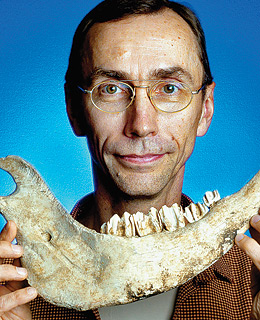
Svante Paabo
Even after 148 years, many people still argue about whether Charles Darwin's theory on human evolution is correct. Svante Pääbo has done more than argue, conducting some of the most exacting work ever attempted on the DNA of human and nonhuman primates, including his spectacular 2006 announcement that he had decoded fragments of DNA from remains of Neanderthals. In so doing, he is replacing speculation with scientific fact.
Pääbo, 52, is director of the department of evolutionary genetics at the Max Planck Institute for Evolutionary Anthropology in Leipzig, Germany. He began his run of discoveries in 1985 when he isolated dna from a 2,400-year-old Egyptian mummy. In the 1990s, I had the pleasure of being present for some of his work as we collaborated during my sequencing of the human genome. Pääbo had sequenced a number of random sections of the chimpanzee genome, which he compared with human DNA sequences and found had an average of only 1.2% difference.
While looking for small genetic variances between the two species, Pääbo made headlines again with his characterization of the FOXp2 gene, thought to be associated with language and speech. Most recently he and his team surprised the scientific world with their Neanderthal breakthrough. Their work is challenging at so many levels: recovering DNA that is 38,000 years old is hard enough; doing so without contaminating it is even more difficult, since the DNA on one fingerprint is enough to throw off the results. While Pääbo's group has collected and analyzed only a small portion of the Neanderthal genome, the data thus far support existing theories about Neanderthal and modern human descent, including the notion that there was little interbreeding between them. Pääbo's stated goal over the next few years is to provide the complete Neanderthal genome, which will lead to an even clearer understanding of human evolution—and an even greater appreciation of how we came to be at all.
Venter is an acclaimed entrepreneurial biologist who led Celera Genomics' privately funded effort to sequence the human genome in 2001